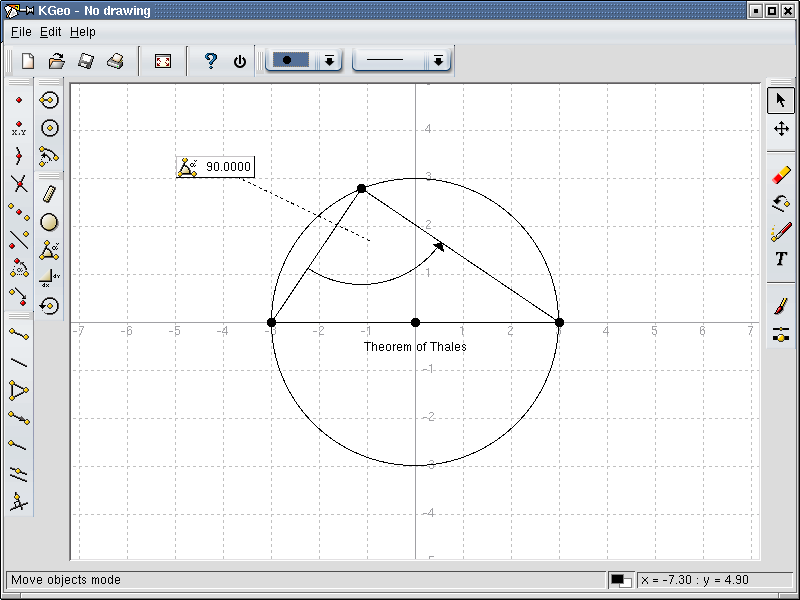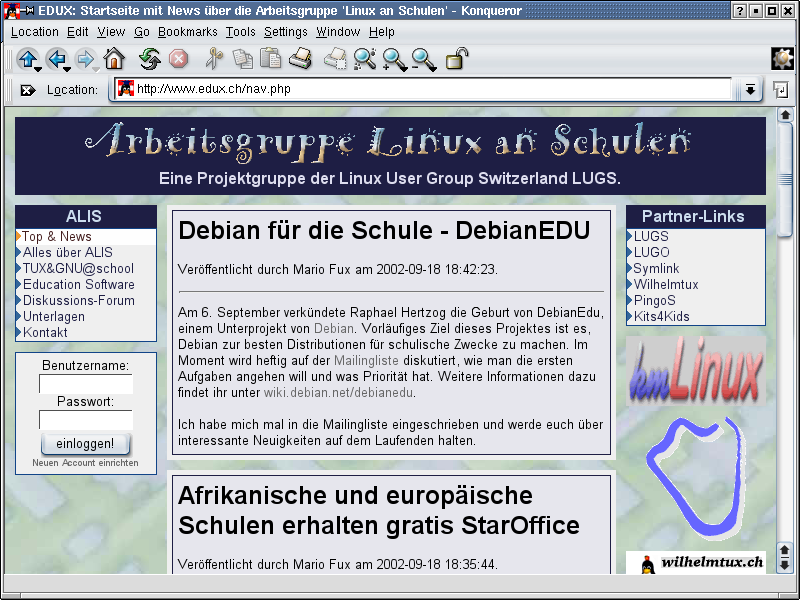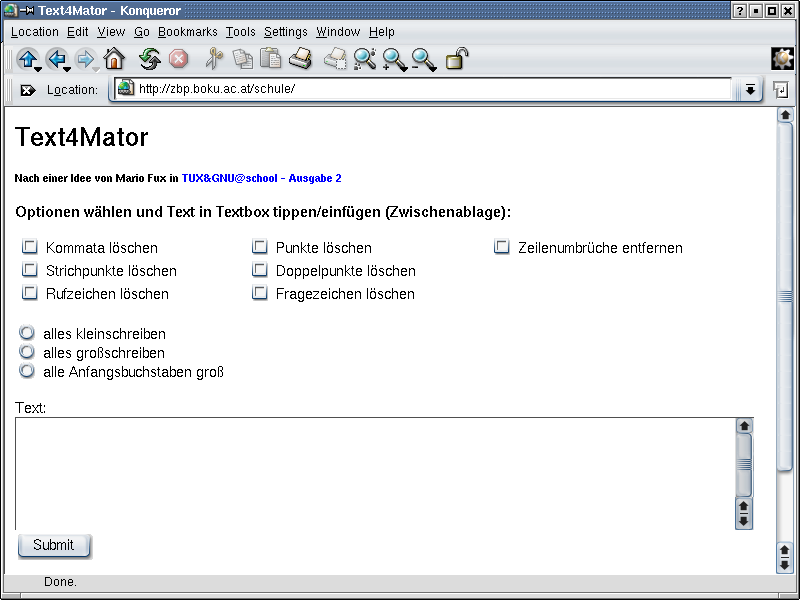TUX&GNU@school - 3rd edition
Every month the column TUX&GNU@school [2] reports about free education software, a homepage on the topic and an easy to implement idea. This month I talk about KGeo, a free geometry programm for KDE, about edux.ch, the info portal for Swiss schools and GNU/Linux and about the idea "Textfilter - filters once for a good thing".
Welcome to the third and last edition of TUX&GNU@school, the "last" only in the sense of the first triple serie ending with this edition. Now it's definitive: I will release the column furthermore monthly. With the next edition there are some news but more about this in the next month. But now to the first item.
KGeo - Geometry with the mouse
KGeo [3] [4] is a free geometry education program which which recently became part of the KDE-Edutainment project [5]. It's developed by Marc Bratsch and available in German and English at the moment. I tested the Version 1.0.2 under Debian GNU/Linux 3.0 and KDE 2.2.2.
After the first start you right catch sight of the main window of KGeo in which the single function panels are disposed at the sides. The construction board with an underlying coordinate system is in the middle. Generally the interfaces isn't overloaded with functions and with it clearly. Besides the menu the program has another five function panels until now that each user can arrange him- or herself. Thereby three panels are thought for the construction of geometric objects, another one contains functions for measuring and calculating of lengths, areas, etc. and the last panel invokes general ways you need for erasing or moving of objects.
When the user works with KGeo, he is always in one of three modes. These are the construction mode, the drag mode and trace mode. It is possible, in the construction mode, to draw geometric objects like points, routes or triangles farther there are methods for vectors, centres, parallels or angles too. With combination of these objects and methods you then even can construct reflections, translations or rotations. If you want to size the drawn figures the developer made tools to measure the circle areas, distances, angles, slopes or circumfences. All construction buttons have an information window that appears if the mouse pointer is over the button. These windows and the short sentence in the status panel explain the function as good that you don't have to work in and you can begin your work in a moment.

Screenshot 1: KGeo and the theorem of Thales
In the drag mode you can move the single objects in the coordinate system, dependences like reflection or a rotations with certain angle stay maintained respectively are ongoing tracked. By enabling the trace mode too which is possible for each point separately, you can even track the exact move or points. Then if you're happy with your drawing and you want not only save it but also showing the result to your teacher the next day, the best way to do this is to print it. Of course this can KGeo too.
But for all that there is of course a German and English manual for the ongoing geometry masteress. That is quite short and bare but even so good and easy to understand. I personally like especially the chapter "Using KGeo" which explains constructions for the encouragement at schools but "only" the theorem of the Thales circle up to now. But I'm sure some of the TUX&GNU@school readers could change this ?!? If in any case we talk about KGeo at school I want to talk about the possibility switching KGeo into the Kioskmode. In this mode the coordinate system with the drawing is displayed on the whole screen but you can't change anything then. But at the end of the report I have to give you some bad news. It seems as if KGeo isn't developed anymore at least at the moment. Nevertheless a large "thank you" to Marc for the program, I like it and surely not only me.
But now continues to the home of the "ALIS - Arbeitsgruppe Linux an Schulen" (Swiss work group for linux at school).
edux.ch - the info portal for Swiss schools and GNU/Linux
At least, a project [6] which I am actively working in, and, besides that, the project out of which the TUX&GNU@school originated. The "ALIS - Arbeitsgruppe Linux an Schulen" (Swiss work group for linux at school), the group behind edux.ch, originated out of the LUGS - Linux User Group Switzerland [7] in november 2001. The three people Christoph Kuhn, Daniel Dahinden and Mario Fux founded the task force all people employing with Free Software and GNU/Linux at schools already beforehand. We want to create an information plattform for all the Swiss (and other) schools interesting on the topic.
When you enter the URL http://www.edux.ch in the favorite browser, first you'll see a welcome page. Following the shown link you'll come to the front page of the Swiss information portal. This is divided in three columns as you can see in screenshot 2. Leftmost there is the navigation panel which is on all the other sides too, beneath it an input window for the username and the password is situated where interested and already registered people can log in. At the right side there are some links to chummy groups and projects like the already known PingoS [8] or WilhelmTUX [9]. As you can see at the navigation panel the website ist subdivided in seven sections up to now. Thereby the first is the front page itself whereas all the rest have subsections unless "Kontakt" (contact) [10].

Screenshot 2: Front page of edux.ch
In the first purview "Alles über ALIS" (everything about ALIS) [11] the interested reader can get to know more about the task force e.g. how the group is compound and how it is originated. By now the third link [12] should show you something well known viz the current and all past editions of TUX&GNU@school. Probably in the near future there you can find more about the "easy to implement ideas" mainly about the already implemented ones. In the section "Education Software" [13] you can find information about kmLinux [14] and you can order it in Switzerland. More about kmLinux perhaps more in one of the next editions. You can find there a "Linksammlung" (link collection) [15] about free education software and conditional sites.
Then the fifth reference guides to a central section of edux.ch, the Forum [16]. So far three active forums and a test-forum are arranged. You can discuss and criticise about themes in the context of Free Software at schools in the forums "Linux im Bildungsbereich" (Linux at school), "Fragen zu Linux-Software" (questions about linux software) and "Anregungen und Kritik an ALIS" (suggestions and criticism about ALIS). The first two forums can be subscribed optionally as mailing lists too.
You find brochures [17] in the second last section. There will be more in the future but until now you'll find a linux guide called "SuSE Linux verwenden - Ein Leitfaden für Windows- und Macintosh-BenutzerInnen" (Using SuSE Linux - a guide für users of Windows and MacOS), a selection of German OpenOffice.org and StarOffice courses for downloading as pdf or text files and a German and French documentation about the free 2D-CAD software QCad [18]. How and where you can find us is written on the last page under "Kontakt" (contact) [10].
What we're still missing is more (wo)manpower. We have many ideas and a lot to do and need additional helpers for that. If somebody is interested he or she can send us an email to [19]. As a little stimulus I still want to mention two projects we're working on: On the one hand this is the email survey on education software publishers concerning available education software for GNU/Linux and on the other hand we test education software for Windows and Macintosh under WINE [20] and WineX [21] and then we write little HOWTOs.
Oh yes before I'll forget it. For all the people who doesn't know it, Switzerland has got four national languages and so you always have to accost all speech groups. We want this too and as a first step we'll publish our whole website besides in German in French too. Interesting translators for Italian and Rätoromanic are supposed to send an email to [19].
"Textfilter - filters once for a good thing"
Before I'll come to the idea of this month I can talk this time too about an implementation of idea of the last month. For remembrance: The idea of the last time was to format text, to use small and large letters and to erase punctuation marks. Already one week after publishing TUX&GNU@school 2 [22] Roland Spielhofer told me that he implemented the idea in PHP and that it is now available unter [23]. After a query about the source code he told me among others that the conversion took "only" half an hour. This is a good example for what I want to accomplish with this section. A problem that tooks a lot of time for a teacher or a pupil can be implemented by a talented programmer in only a few minutes and so saving time for a lot of people. Nevertheless or right therefore the work of the programmer should be appreciated. Also a "thank you" to Roland in Vienna, Austria for this time.

Screenshot 3: Text4mator form Vienna
But now to the idea of this month. Who doesn't know the separation excercises we all made at school. Well already various worksheets were made for this theme and will made again. Thereby and by related jobs the elaborating teachers have alwasy to make lists with complying words. For the hacker next door it would be easy to write a program or script which searches words out of a text, given or searched in the internet, and packetises in a list. Perhaps even making a worksheet yet ?!? I concede this month's idea isn't far thought respectively worked out. But let you flow your neurons and surprise the readers of the next edition with further going and maybe crazy ideas.
At the end I still want to ask for reports for a new section in this column. At the next or the next but one time I want initiate a new section beneath the existing three reporting about already realised projects at schools and migration to free software and/or GNU/Linux. If you don't want to write your own report you can answer to the questions next released under [12] and send the text to me.
That's it for this month. Up to the next time when there are a lot of news ;-).
Links:
[1] Criticism, questions,
comments, ideas and more please to: foxman@lugo.ch
[2] Homepage
of TUX&GNU@school:
fsfe.org/activities/tgs/tgs.en.html
[3] KDE-Edutainment
homepage of KGeo: edu.kde.org/kgeo
[4] Sourceforge.net
homepage of KGeo: kgeo.sourceforge.net
[5] Homepage of the
KDE-Edutainment project: edu.kde.org
[6] Homepage of the "ALIS -
Arbeitsgruppe Linux an Schulen" (Swiss work group for linux
at school): www.edux.ch
[7] Homepage of the LUGS -
Linux User Group Switzerland: www.lugs.ch
[8] Homepage of
the PingoS: pingos.schulnetz.org
[9] Homepage of
WilhelmTUX: www.wilhelmtux.ch
[10] EDUX.ch
-> "Kontakt" (contact)
[11] EDUX.ch
-> "Alles über ALIS" (everything about ALIS)
[12] EDUX.ch
-> TUX&GNU@school
[13] EDUX.ch
-> Education Software
[14] Homepage of
kmLinux: www.lernnetz-sh.de/kmlinux/
[15] EDUX.ch
-> "Linkssammlung" (links collection)
[16] EDUX.ch ->
"Diskussions-Forum" (discussion forum)
[17] EDUX.ch
-> "Unterlagen" (brochures)
[18] Homepage of QCad:
www.qcad.org
[19] Questions, criticism and
more for the ALIS and about edux.ch to:
alis@lugs.ch
[20] Homepage of WINE - Wine
Is Not an Emulator aka WINdows Emulator:
www.winehq.com
[21] Homepage of
TransGaming and WineX: www.transgaming.com
[22] TUX&GNU@school
- 2nd edition:
fsfe.org/activities/tgs/tagatschool2.html
[23] Text4mator of
Roland Spielhofer from Vienna:
zbp.boku.ac.at/schule
About the author:
Mario Fux finished 1999 the PrimarlehrerInnenseminar in Brig after he made up mathematical and natural scientifical matura. In a body with two colleagues he founded the "ALIS - Arbeitsgruppe Linux an Schulen" (Swiss work group for linux at school). Meanwhile he studies at the Swiss Federal Institut of Technology Zurich informations technology and electrical engineering. And if he once doesn't spend his time in front of the PC, he sits at his nature pond in the mountains.
Copyright (c) 2002 Mario Fux. Permission
is granted to copy, distribute and/or modify this document
under the terms of the GNU Free Documentation License, Version
1.2 or any later version published by the Free Software
Foundation; with no Invariant Sections, no Front-Cover Texts,
and no Back-Cover Texts.
A copy of the license can be found at http://www.gnu.org/licenses/fdl.html.
Thanks to Christian Selig and Kristian Rink for their help with the translation !